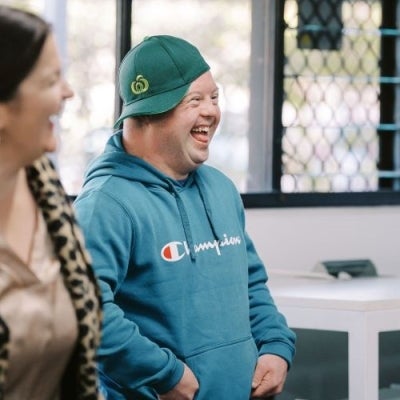Refine results
-
Race Discrimination14 December 2012Project

In our own words - African Australians: A review of human rights and social inclusion issues (2010)
In 2007, the former Race Discrimination Commissioner, Tom Calma, had a vision to develop a human rights initiative based on the experiences of African Australians, to inform future policy and programs. -
14 December 2012Book page
National Inquiry into Employment and Disability: Issues Paper 5
From the outset of this Inquiry, it was apparent that there was a need for clearer information on the services offered by the Commonwealth regarding employment of people with disabilities. -
Disability Rights14 December 2012Speech
The continuing battle for equal rights for people with a disability
I have to admit that two months ago when I took the title " The Disability Discrimination Act and the continuing battle for equal rights for people with a disability" for my paper today I was not attaching great importance to the precise words of that title. -
14 December 2012Book page
Chapter 4: Beyond the Apology - an agenda for healing: Social Justice Report 2008
On 13 February 2008 Prime Minister Kevin Rudd, on behalf of the Australian Parliament, made a historic and long overdue national Apology to the Stolen Generations. With eloquence and emotion, Prime Minister Rudd said what so many Australians have wanted to say, and what so many Indigenous peoples have needed to hear: -
14 December 2012Book page
3. Managing mental illness in the workplace
Some workers will choose to disclose their mental illness if they require workplace support. Others may choose not to disclose their illness if they feel they do not require any workplace support or fear an adverse reaction. -
Disability Rights14 December 2012Speech
Opportunity knocks
I follow this custom wherever I go to speak in public. I think recognising Australia ' s indigenous peoples and their prior ownership of this land in this way is more than just good manners. It is an important part of recognising our diversity as a nation. -
Commission – General14 December 2022Speech
2022 Human Rights Day Oration by Larissa Behrendt
"No More Just Tinkering at the Edges" Human Rights Day Oration by Distinguished Professor Larissa Behrendt AO 9 December 2022 I pay my respects to the Gadigal and the Elders who have kept knowledge on this country and shared so generously this unceded land. Before I start, I would like to thank the Commission for the honour of the 2021 Human Rights Medal. The award reflects a long-term… -
14 December 2012Book page
Chapter 2: Constitutional reform: Creating a nation for all of us - Social Justice Report 2010
A century ago, the Australian people engaged in a debate about creating a nation. They held meetings...They wrote articles and letters in newspapers. Many views were canvassed and voices were heard. The separate colonies, having divided up the land between them, discussed ways of sharing powers in order to achieve a vision of a united Australia. The result was the Australian Constitution,… -
Legal14 December 2012Webpage
Review of Australia’s Fourth Periodic Report on the Implementation of the International Covenant on Economic Social and Cultural Rights
Recommendation 2: The Australian Government pass a federal Human Rights Act that includes recognition and protection of economic, social and cultural rights. -
Legal17 May 2023Speech
Access to justice
Your Honours, distinguished guests: I acknowledge the traditional owners of the land, the Wurrindjeri people of the Kulin nation and pay my respects to their elders, especially to those elders present today. May also thank our host the Hon Justice Mordy Bromberg and the ICJ for inviting me to this, the ninth Community Opening of the Legal Year. Together we celebrate the partnership of the… -
Legal14 December 2012Webpage
SAGE: Submission to Inquiry into Aboriginal Customary Law in NT
The Aboriginal and Torres Strait Islander Social Justice Commissioner has also made a submission to this inquiry. To access that submission click here. -
14 December 2012Book page
Social Justice Report 2003: Chapter 2: Reconciliation and government accountability
In the Social Justice Report 1999, my first report as Social Justice Commissioner, I identified four key themes and challenges that existed in the approach of the federal government to Indigenous policy making at the time. These were moving beyond welfare dependency, accountability, participation and reconciliation.[1] Since the release of that report approximately four years ago, the key themes… -
14 December 2012Book page
Social Justice Report 2005: Chapter 3
The first twelve months of the federal government's new arrangements for the administration of Indigenous affairs has ended. The primary focus of this period has been on abolishing the Aboriginal and Torres Strait Islander Commission (ATSIC) and creating new processes to engage with local Indigenous communities and coordinate mainstream delivery of services to Aboriginal and Torres Strait… -
Disability Rights7 May 2024Webpage

Lessons from IncludeAbility
Watch the webinar with the Centre for Social Impact Swinburne on the background, lessons and evaluation findings from IncludeAbility as well as next steps... -
Legal14 December 2012Webpage
SJU: Submission to Inquiry into Aboriginal Customary Law in NT
To access the Executive Summary of the Aboriginal and Torres Strait Islander Social Justice Commissioner's Submission to the Northern Territory Law Reform Committee Inquiry into Aboriginal Customary law in the Northern Territory click here. -
Aboriginal and Torres Strait Islander Social Justice14 December 2012Publication
Submission: Human rights and fundamental freedoms of Indigenous people
The Australian Human Rights and Commission has made a submission on behalf of the Indigenous Peoples Organisation Network (IPON) of Australia to Professor S. James Anaya, UN Special Rapporteur on the human rights and fundamental freedoms of Indigenous Peoples, on the current status of Indigenous human rights in Australia for his Mission to Australia which is taking place from 17-28 August 2009. -
14 December 2012Book page
Native Title Report 2003 : Chapter 4: Native Title and Agreement Making : a Comparative Study
The failure in Australia to perceive native title and land rights as the basis on which to address Indigenous economic and social development has been evident at legal, policy and administrative levels. Legally, the increasingly narrow interpretation of native title by the High Court has, as Noel Pearson has pointed out, stripped native title of much economic meaning or benefit. -
14 December 2012Book page
16. Temporary Protection Visas for Children Released from Immigration Detention
The immigration status that results in the detention of children under Australian law also affects their entitlements to various services on release from detention, after they have been recognised as refugees. As discussed in Chapter 6 on Australia's Detention Policy, most children detained in immigration detention facilities for long periods are detained because they arrive in Australia without… -
14 December 2012Book page
Native Title Report 2003 : Chapter 1
Australia is a wealthy nation. In 2003, Australia ranked fourth in the United Nations Human Development Index (1) indicating Australians enjoyed one of the highest qualities of life in the world. Overall, Australia ranks equal fourth with the highest life expectancy at birth (79.0 years) suggesting Australians are among the healthiest people in the world. (2) -
14 December 2012Book page
Native Title Report 2005 : Chapter 4 : Leasing on Indigenous land: a human rights appraisal
This report has focused on proposals for the leasing or alienation of Indigenous land, with a specific focus on the Indigenous Land Tenure Principles released by the National Indigenous Council (NIC). The purpose of this Chapter is to discuss these Principles from a human rights perspective, with a particular focus on the right to development.
Pagination
- First page « First
- Previous page ‹ Previous
- 1
- 2
- Current page 3
- 4
- 5
- 6
- 7
- 8
- Next page Next ›
- Last page Last »
